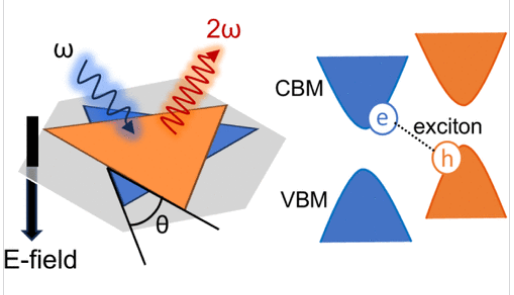
近日,北京计算科学研究中心黄兵团队研究了二维Janus系统非线性光学激子工程。该研究于2025年11月24日发表在《美国化学会志》上。
非线性光学(NLO)响应对于激光、传感和量子技术至关重要。在二维系统中,多体激子效应可以深刻改变NLO响应,产生新的激子介导的NLO现象。然而,人们对真实材料中这些效应的理解仍然有限,特别是通过激子可控调控NLO响应的能力。
研究组报道了在实验合成的基态稳定的Janus单层材料RhSeCl中观测到强烈的激子二阶谐波产生(SHG)。结合密度泛函理论和多体微扰理论,他们发现其巨大的SHG不仅源于固有的对称性破缺,更关键的是源于激子辅助的双共振机制。在双层结构中,不同的堆叠构型可实现巨大的SHG调制,并伴随着主导贡献从层内激子到层间激子的转变。垂直电场通过精确调控层间与层内激子的杂化进一步增强了可调性。该研究确立了Janus材料作为有前景的激子NLO平台的地位,通过可控激子工程能够系统地设计非线性量子光源。
附:英文原文
Title: Exciton Engineering of Nonlinear Optics in a Two-Dimensional Janus System
Author: Xuelian Sun, Chengzhi Wu, Yang Li, Liangting Ye, Bin Cui, Zeyu Jiang, Bing Huang
Issue&Volume: November 24, 2025
Abstract: Nonlinear optical (NLO) responses are vital for lasers, sensing, and quantum technologies. In two-dimensional systems, many-body excitonic effects can profoundly modify NLO responses, giving rise to novel exciton-mediated NLO phenomena. However, our understanding of these effects in real materials remains limited, particularly regarding controllable manipulation of NLO responses via excitons. Here, we report strong excitonic second-harmonic generation (SHG) in an experimentally synthesized, ground-state-stable Janus monolayer, RhSeCl. Combining density functional theory and many-body perturbation theory, we reveal that its giant SHG arises not only from intrinsic symmetry breaking but also crucially from an exciton-assisted double resonance mechanism. In bilayers, distinct stacking configurations enable giant SHG modulation, accompanied by a switch in the dominant contribution from intralayer to interlayer excitons. Vertical electric fields further enhance tunability through precise control of hybridization between interlayer and intralayer excitons. Our finding establishes Janus materials as a promising excitonic NLO platform, enabling the systematic design of nonlinear quantum light sources through controlled exciton engineering.
DOI: 10.1021/jacs.5c15144
Source: https://pubs.acs.org/doi/abs/10.1021/jacs.5c15144
JACS:《美国化学会志》,创刊于1879年。隶属于美国化学会,最新IF:16.383
官方网址:https://pubs.acs.org/journal/jacsat
投稿链接:https://acsparagonplus.acs.org/psweb/loginForm?code=1000
